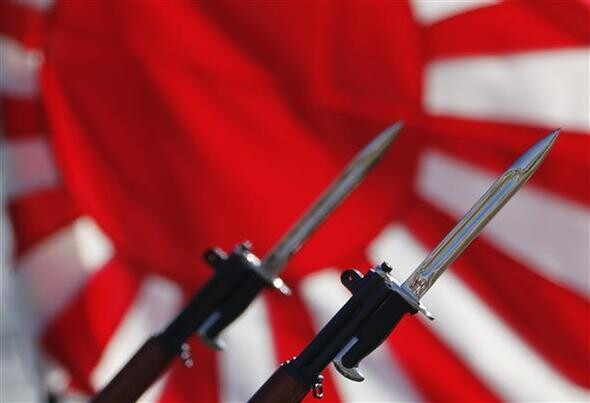hankyoreh
Links to other country sites 다른 나라 사이트 링크
Japan’s moves toward collective self-defense related to US alliance

By Gil Yun-hyung, Tokyo correspondent
Why is Japan so insistent on exercising its right to collective self-defense?
The Asahi Shimbun newspaper published an analysis on Feb. 3 of the Shinzo Abe administration’s psychology, based on the view of domestic national security experts and former and current Defense Ministry officials. Its conclusion was that Tokyo is trying to make an early show of loyalty to Washington to prepare for the possibility of a military clash with China over the disputed Senkaku Islands (known as the Diaoyu Islands in China). The analysis, while somewhat Japan-centered, could be read as proof that the key security concern for Abe and Japanese conservatives is actually China.
In mid-February, Japan and the US staged a joint exercise to recapture a simulated Japanese island at a Marine base on the California coast. The exercise had an elite Japan Self-Defense Forces (SDF) unit land on the island under the cover of US helicopters and landing boats. It was based on a scenario of the US teaming with Japan to recapture an island after being mobilized to help according to the Japan-US Security Treaty.
“Under the current interpretation of the Constitution, Japan would only be able to exercise its right to individual self-defense for a military encounter on the Senkakus,” the article stated. “It would be the United States that exercised the right of collective self-defense in coming to help the SDF members.”
The analysis went on to offer one take for the Abe administration’s rationale for focusing on collective self-defense.
“The logic is that Washington will only defend the Senkakus if Tokyo is willing to allow the SDF to fight in wars involving the United States,” it explained.
A participant in the Advisory Panel on Reconstruction of the Legal Basis for Security, a group advising Abe, explained, “The United States does not want to fight for such islets [the Senkaku Islands]. Unless Japan shows that it is prepared to fight together with the United States when the time comes, the United States will say to Japan about defense of its outlying islands, ‘OK, sayonara.’”
Indeed, the US public is noticeably wary about getting drawn into a conflict over the islands that could escalate into a head-on clash with China. Data from the Japanese Foreign Ministry last month showed 67% of Americans polled saying the US should honor the terms of the Security Treaty - a 22 percentage point drop from a year before.
Conscious of this, the Abe administration is attempting to exercise collective self-defense rights by positing scenarios that are not logically necessary. Perhaps the best examples came in the Advisory Panel’s first report, where scenarios of collective self-defense included “a Japanese counterstrike when a US warship is attacked” and “shooting down a ballistic missile headed toward the US.”
Kyoji Yanagisawa, an assistant chief Cabinet secretary during Abe’s first term as Prime Minister in 2006-07, said that the SDF could invoke individual self-defense to respond to an attack on a US warship. He added, “With the current technology, it would be impossible to physically shoot down such a missile”.
Speaking on condition of anonymity, a current Japanese Defense Ministry official asked, “Is Japan currently prepared to allow SDF members to be sacrificed for the sake of defending other nations?”
Meanwhile, concerns that the hasty pursuit of collective self-defense could undermine Japanese democracy are growing. Osamu Akiyama, a former director-general of Japan’s Cabinet Legislation Bureau, said changing the interpretation to allow the right to collective self-defense “would set a precedent that would let those in power freely change interpretations of the Constitution.”
“The Constitution also contains such fundamental elements as respect for basic rights, freedom of expression and separation of state and religion,” Akiyama continued. “What is most worrisome is that administrations could move toward unilaterally changing the interpretation of such elements as well.”
Please direct questions or comments to [english@hani.co.kr]
Editorial・opinion
![[Guest essay] Amending the Constitution is Yoon’s key to leaving office in public’s good graces [Guest essay] Amending the Constitution is Yoon’s key to leaving office in public’s good graces](https://flexible.img.hani.co.kr/flexible/normal/500/300/imgdb/original/2024/0416/8917132552387962.jpg) [Guest essay] Amending the Constitution is Yoon’s key to leaving office in public’s good graces
[Guest essay] Amending the Constitution is Yoon’s key to leaving office in public’s good graces![[Editorial] 10 years on, lessons of Sewol tragedy must never be forgotten [Editorial] 10 years on, lessons of Sewol tragedy must never be forgotten](https://flexible.img.hani.co.kr/flexible/normal/500/300/imgdb/original/2024/0416/8317132536568958.jpg) [Editorial] 10 years on, lessons of Sewol tragedy must never be forgotten
[Editorial] 10 years on, lessons of Sewol tragedy must never be forgotten- [Column] A death blow to Korea’s prosecutor politics
- [Correspondent’s column] The US and the end of Japanese pacifism
- [Guest essay] How Korea turned its trainee doctors into monsters
- [Guest essay] As someone who helped forge Seoul-Moscow ties, their status today troubles me
- [Editorial] Koreans sent a loud and clear message to Yoon
- [Column] In Korea’s midterm elections, it’s time for accountability
- [Guest essay] At only 26, I’ve seen 4 wars in my home of Gaza
- [Column] Syngman Rhee’s bloody legacy in Jeju
Most viewed articles
- 1[News analysis] Watershed augmentation of US-Japan alliance to put Korea’s diplomacy to the test
- 2[Guest essay] How Korea turned its trainee doctors into monsters
- 3[Column] A death blow to Korea’s prosecutor politics
- 4‘National emergency’: Why Korean voters handed 192 seats to opposition parties
- 5[Photo] Cho Kuk and company march on prosecutors’ office for probe into first lady
- 6[Guest essay] Amending the Constitution is Yoon’s key to leaving office in public’s good graces
- 7Exchange rate, oil prices, inflation: Can Korea overcome an economic triple whammy?
- 8US grants Samsung up to $6.4B in subsidies for its chip investments there
- 9[Editorial] 10 years on, lessons of Sewol tragedy must never be forgotten
- 10After Iran’s attack, can the US stop Israel from starting a regional war?